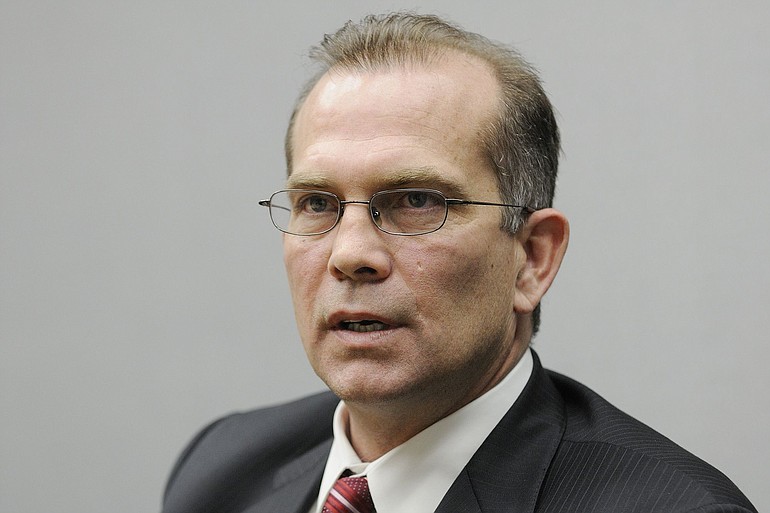State Sen. Joe Zarelli is calling for creation of an independent office to investigate allegations of widespread fraud in the Department of Social and Health Services reported anonymously by DSHS workers on a Senate Republican Caucus website.
Based on those comments, Zarelli, ranking Republican on the Senate Ways and Means Committee, also is calling for an increase in the department’s fraud investigation staff, a freer exchange of information among state agencies in fraud investigations, and reform of the use of state-issued Electronic Benefit Transfer cards, known as EBTs.
“When we start looking at this and peeling back this onion, it’s very apparent to me that we can save millions of dollars by simply going back to an approach of investigating money … that is being spent, that is being collected in a fraudulent way,” Zarelli said in a video posted Tuesday on the caucus website. He said such an investigative office should be “separate and unique” from that of the DSHS secretary.
Over the past two months, the caucus has invited state employees to use its “Reset Washington” website to submit ideas for cutting the cost of state government. On Tuesday, the caucus released what a spokesman called “disturbing allegations received directly from frontline employees within state government’s largest agency.”
More than a dozen DSHS employees offered comments, some extensive, describing widespread fraud in state-administered social service programs, including welfare assistance, food stamps, subsidized child care and medical assistance. The comments regarding DSHS were among 7,500 received by Senate Republicans since Sept. 16. The Columbian reviewed the comments in their entirety.
Several described a system in which clients apply for assistance by phone or the Internet without verification of their income and other assets.
One reported that police routinely recover EBT cards from arrested drug dealers.
Another described “chains” of state-subsidized child care providers who are paid to watch the children of other state-subsidized child care providers.
Yet another described a revolving door of clients who allegedly work the system to receive welfare payments through the Temporary Assistance to Needy Families program for longer than the five-year limit.
Another alleged that some families claim and receive food stamps for children who don’t exist.
Several workers said the agency has cut its fraud investigation staff to save money while leaving high-paid managers in place.
Others said managers are reluctant to pursue fraud aggressively for fear of losing federal grants if the agency’s fraud rate exceeds a certain threshold.
“DSHS is pushing money out the door faster than they can get it, and we’re constantly told that the more money given out, the more money DSHS will ask from the feds next year,” one employee wrote, asking, “This is the way to use taxpayer money?”
Thomas Shapley, director of communications for DSHS, said the department is vigilant in its efforts to curb fraud.
“We already take fraud very seriously, and we encourage anyone to report fraud through their supervisor or through a fraud hot line,” he said. The DSHS website’s fraud hotline has instructions on reporting fraud and downloadable complaint forms, he noted.
Shapley said the department’s Division of Fraud Investigation had 55 employees in July 2008 and is down to 38 now, due to retirements, voluntary departures and the state hiring freeze. He said DSHS is applying for an exemption from the freeze so it can hire six more investigators.
“While Washington is looked to nationally for our strong fraud and abuse and fund recovery programs, the state is faced with an environment of diminishing resources and tough decisions need to be made,” he said.
Shapley provided figures showing that in fiscal 2009, the state’s Medicaid fraud program recovered $20.6 million, saved $381 million by identifying responsible third-party insurers, and recovered $48.7 million in client overpayments and other fraudulent benefits paid.
He noted that the U.S. Department of Agriculture has recently awarded the state two bonuses totaling $6 million for its high accuracy rate in processing food stamp benefits.
When a Seattle TV station reported that welfare recipients were using their EBT cards in Washington casinos, “we jumped on that,” he said. “The ATMs in all of those establishments won’t accept EBT cards anymore.”
Shapley said he’s not sure an outside office is needed to investigate fraud in the programs DSHS administers. Federal agencies, the State Auditor’s Office and the Joint Legislative Audit Review Committee all monitor the performance of state agencies, he said.
“We take fraud seriously,” Shapley said. “Bring us names, bring us phone numbers, and we’ll pursue allegations of fraud, but we can’t do anything without names.”
As for the contention that DSHS looks the other way when confronted with evidence of fraud, he said that’s illogical.
“We are in difficult budget times,” he said. “Everyone who works here knows every penny and every dollar counts. If money is being obtained fraudulently, that means less money for people who are eligible and who are in need. With budget reductions, the people who come to us will be more and more the most needy and the most vulnerable.”
Kathie Durbin: 360-735-4523 or kathie.durbin@columbian.com.



